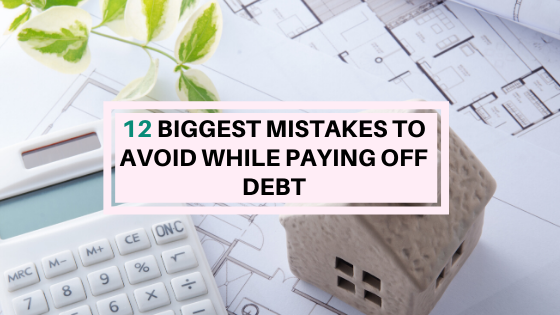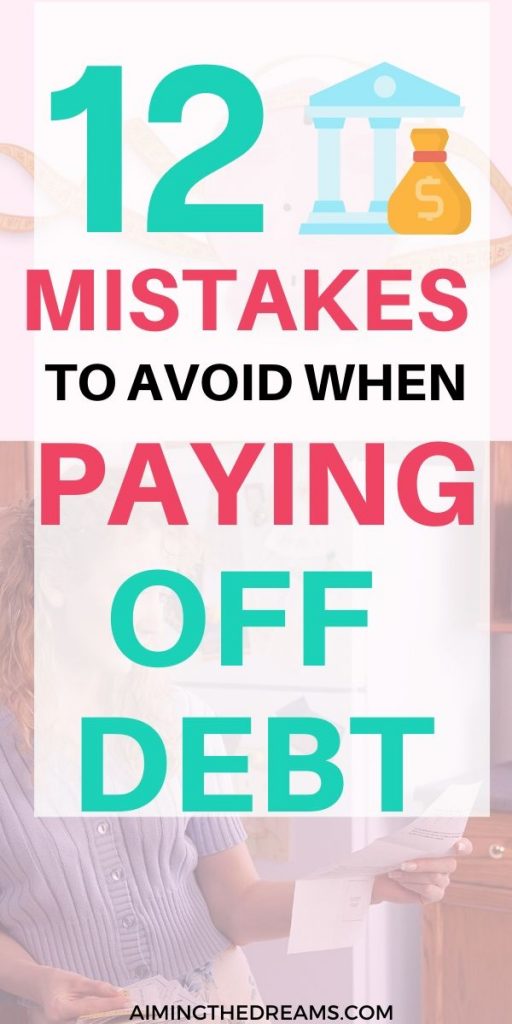Paying off debt and being debt-free is the dream we all have in our minds. It feels so good to be debt-free. However, with limited resources and a tight budget, it seems impossible. To eliminate massive debt, you will need a plan and the determination to stick to that plan. Also, it is essential to avoid mistakes while paying off debt.
Paying off debt is not easy. It takes planning and sticking to that plan for a long time. Doing it without any real plan will not give you the desired results.

Disclosure: Some of the links in this post are affiliate links, meaning I may earn some commission if you buy through my link at no extra cost. For full disclosure, click here
Mistakes to avoid while paying off debt
1. Not having an Emergency fund
Having an emergency fund will help you have a cushion. I know when we are trying to pay off debt, we want to get rid of it as early as possible. But, at this point, saving money for an emergency fund is overlooked.
Even $500-1000 in savings gives you the much-needed peace required while paying the debt.
An emergency fund helps if some emergency arises while paying a debt. For example, you may have to deal with a broken car, home maintenance, or medical issues. An emergency fund helps you avoid incurring more debt during this kind of situation.
What to do
Start an emergency fund today. Start with adding $50 a week. Then, if you feel that you don’t get spare money, do these.
- Cut your spending and buy only needed items.
- Start doing surveys. You will have some money at the end of the month to add to your emergency fund
- Stop buying your lunch every day and take your home-cooked lunch with you
- Cancel all subscriptions
- Lower your utility bills
Read more
How to create an emergency fund
2. Not automating your monthly installments
This is important because you may forget to pay your monthly installment, which will further incur debt. Automation helps in delivering the installments without missing any payment.
Whenever you forget to pay your installment, you accrue debt. Therefore, keep direct debits for your minimum payments to all debt.
What to do
- Automate your payments
- Keep money in your account, which you use to pay installments
3. Not having a paying plan
This is by far the essential step. Not having a plan is a recipe for disaster. Furthermore, without a focused strategy, it is highly that you may lose the momentum and motivation to stick to your debt repayments.
Paying minimums on all debts without a clear focus or trying to pay them all together will not help you eliminate debt.
What to do
Pick any plan and stick to it. Dave Ramsey’s Snowball method is excellent in keeping the motivation to pay the debt. When you eliminate one debt, you feel accomplished and motivated to tackle the next debt enthusiastically.
4. Not having a functional budget
Not planning for your future expenses and paying debt can backfire on you. Don’t pay your debt without creating a budget. You may pay a significant amount of debt on your credit card in excitement, and then you may not have left any money to pay the bills.
Create a budget with basic categories, and don’t forget to allocate some amount for entertainment and fun. If you will leave this category, it is highly that you will overspend.
What to do
Take a pen or pencil, and create a plan to allocate money to different categories. If you like digital budget planners, you can use those. It just depends on you how you want to have an actionable budget.
- Create a functional Budget
- Stick to the budget
How to create a budget the easy way
5. Taking loans to pay a debt
Sometimes people take more loans to pay the loans. Second mortgages and personal loans can get expensive and drain your disposable income. Their interest rates are consistently high, which will make your situation worse.
This can keep you always in a position to be constantly broke.
6. Not having focused goals
Without having focused goals, it is difficult to eliminate the debt. Goals give a dimension to your tasks and daily lives. Debt is no different. If you want to stick to debt repayment, create plans to repay the debt.
SMART goals like how much you want to pay and when will help keep the momentum. Without goals, you may lose motivation on the way.
What to do
Create time-bound goals and accomplish them. If goals seem too big, break them into smaller financial goals.
7. Doing nothing to earn extra
If you think paying debt with the money you earn will take longer to repay the loans, start making a side income. There are many ways you can earn more every month.
Who knows, starting a side hustle may become your full-time business.
What to do
Start some side hustle and make money. Here are some of the ways to start earning a side income.
Make money online from proofreading
Become a Transcriber and make money converting audio into text
Make money from surveys
8. Still using Credit cards for shopping
Studies have shown that those using credit cards to pay for shopping are more likely to spend more. Also, they are more susceptible to impulse buying.
To avoid these two, take cash with you and purchase everything with cash. This way, you will have two advantages: No impulse buying and buying less.
When you have a credit card, you are more likely to spend more without much thinking.
What to do
Keep your credit cards buried somewhere in a place not easily accessible. Instead, start shopping for everything with cash. This will help you refrain from building up more debt.
9. Not paying extra money towards debt
Making only minimums will not help you eliminate the debt. To be free from debt, you have to make extra payments towards the debt. However, it is possible if you know which one you need to pay off first.
Whenever you get any bonus or a pay raise, put that extra money towards your debt. Of course, it is a normal instinct to spend your bonus or extra money you got to pamper yourself or upgrade your car or phone. But unfortunately, this will lead to lifestyle inflation.
Increasing your expenses with your income will keep you in a similar situation for your whole life.
10. Keeping the same spending habits
To pay the debt, changing your spending habits is crucial. If you are a great fan of buying a new car every 3-4 years, think about it. Or if you are obsessed with buying a new phone as soon as it is launched, you need to change.
To live a healthy life, you don’t need much stuff. If your basic needs are met, you can survive well. It means living below your means is the real key.
35 frugal living habits to help you save money
11. Stop paying for expensive hobbies
If you love expensive hobbies like sports, recreational hobbies, or any activity, think about changing them. There are many hobbies to do which are not very expensive.
Even we enroll our kids into expensive activities and sports. It is an excellent idea to pursue all the exercises when you have money but when you are broke, refrain from expensive hobbies and activities to become debt-free.
What to do
You can take those hobbies later. Pause those hobbies for the time being and pay the money towards the debt. Being debt-free is such a feeling that you will enjoy your hobbies better.
12. Not keeping the motivation
It is essential to stay motivated on the journey to be debt-free. It will take some time, depending on your situation. Stay motivated and be on track.
For this, you can take some help or have accountability partners.

How to drastically cut expenses (simple effective ways)
Ways to save money on a tight budget
⭐I hope you like my post and don’t forget to follow me on Pinterest.
